by Clayton Walnum

Way back in 1970, I was riding around with Bob Welch, the bass player in my current band, and he asked me if I had heard of a new group from England named Yes. He told me there was a huge buzz about the group in the musician's community, that Yes was supposed to be phenomenal. I had never heard of Yes, and so just filed the info away for future reference. A few weeks later, I went to see Grand Funk Railroad in concert. The warm-up band turned out to be Yes, touring in support of their new release The Yes Album. By the end of their show, I was a fan for life and have seen them in concert about 20 times since then.
Personal history aside, writing an album-by-album career overview of Yes is a daunting feat, even for a rabid fan like myself. (Yes is my second favorite group of all time, surpassed only by The Beatles.) After all [to date], since 1969, they've released 18 studio albums, 11 live albums, 13 compilations and boxed sets, and eight singles and EPs. Truth be told, these numbers may not be entirely accurate, because it depends on how you count and what you want to include in each category. The count even depends on which conglomerate of musicians you want to call Yes. (Do we count the splinter group Anderson Bruford Wakeman and Howe? I say no.) In fact, Amazon.com lists an unbelievable 105 albums, including the ones I just mentioned, as well as various other imports and collections. Oh yeah, and did I mention over a dozen DVDs and an almost equal number of VHS releases?
By necessity, this series of articles will cover only the band's official studio albums. In this first part of the series, I examine Yes' two mostly overlooked debut albums, as well as the three albums that would make the group the prog legends they are today. So, let's jump into our time machine (don't step on Peabody's tail) and dial up the year 1969...
NOTE: Because I consider Rolling Stone magazine to be among the most credible of the mainstream music reviewers, I'll be including quotes from their reviews of Yes albums. This isn't to say that I agree with everything Rolling Stone has to say (hardly!), but it's always good to get the prog "outsider"'s viewpoint. For the complete reviews, point your browser to www.rollingstone.com.
Yes (1969)
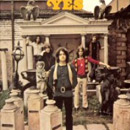 Yes's first album is a flawed blueprint of the band's future direction. By that I mean that several tracks foreshadow the band Yes was to become, but those tracks are accompanied by a couple of mediocre, if not downright terrible, songs. First the good news: Songs like "Beyond And Before," "Looking Around," and "Survival" revealed the energy, musical sense, and musicianship that would lead to future endeavors of the same style such as Yes's cool cover of the Simon and Garfunkel song "America," not to mention the wonderful The Yes Album and Fragile. Moreover, two tracks here, the jazzy "I See You" and the smokin' Beatles cover, "Every Little Thing," were tour de force guitar numbers in which original Yes guitarist Peter Banks strutted his considerable stuff.
Yes's first album is a flawed blueprint of the band's future direction. By that I mean that several tracks foreshadow the band Yes was to become, but those tracks are accompanied by a couple of mediocre, if not downright terrible, songs. First the good news: Songs like "Beyond And Before," "Looking Around," and "Survival" revealed the energy, musical sense, and musicianship that would lead to future endeavors of the same style such as Yes's cool cover of the Simon and Garfunkel song "America," not to mention the wonderful The Yes Album and Fragile. Moreover, two tracks here, the jazzy "I See You" and the smokin' Beatles cover, "Every Little Thing," were tour de force guitar numbers in which original Yes guitarist Peter Banks strutted his considerable stuff.
On the other hand, the track "Yesterday And Today," while a nice enough attempt at a radio-style hit, was too sentimental for my taste, and the aptly titled "Sweetness" (the band's first single), which has to be the worst song Yes ever recorded, lived up to its title by being so sickening sweet, you'd need a dentist after listening. I mean, can you imagine Jon Anderson singing "She puts the sweetness in and stirs it with a spoon"? Excess sugar notwithstanding, Yes was the better of the two albums the band would release before hitting their stride with The Yes Album a couple of years later.
Most of the tracks here featured Yes's confident multi-part vocal harmonies, Jon Anderson's pure and boyish voice, and Chris Squire's melodic and powerhouse bass playing. Tony Kaye's understated yet competent Hammond organ work, however, in no way predicted the direction future keys wizard Rick Wakeman would take the group. (Kaye would soon leave the band due to his refusal to add synthesizers and mellotrons to Yes's music.) Drummer Bill Bruford played vaguely "Bruford-ish," but would develop his signature style more on future albums, not only with Yes, but also with King Crimson, Gong, and U.K.
Says Rolling Stone:
"Curiously enough, Yes' 1969 debut is a relatively down-to-earth affair -- and a not very inspired one at that. The quintet's reworking of the Beatles' "Every Little Thing" illustrates its knack for mysterioso, angelic harmonies, led by singer Jon Anderson. But the band's original compositions are sketchy at best."
Time And A Word (1970)
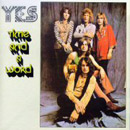 Loving musical experimentation, Yes immediately veered from the course set on their first album by recording their second release, Time And A Word, with a full orchestra. Also of interest was the fact that, although Peter Banks played guitar on the album, the front cover photo showed Steve Howe (Banks was on the back cover), who replaced Banks shortly after the album was recorded.
Loving musical experimentation, Yes immediately veered from the course set on their first album by recording their second release, Time And A Word, with a full orchestra. Also of interest was the fact that, although Peter Banks played guitar on the album, the front cover photo showed Steve Howe (Banks was on the back cover), who replaced Banks shortly after the album was recorded.
This album, like the first, comprised both covers and original numbers, starting off with the Ritchie Havens song "No Opportunity Necessary, No Experience Needed," which featured a blistering Chris Squire bass line. The second cover song on the album was "Everydays," originally a Buffalo Springfield piece penned by Stephen Stills. The interaction between Squire and Bruford in this song's instrumental section was amazing, guaranteed to roast your ears. Wide ranging dynamics, staccato rhythms, synchronized melodies, and searing guitar work made this one of the album's highlight moments.
Other tracks with that developing Yes sound included "Then" -- whose instrumental centerpiece featured Banks' rhythm guitar and Kaye's organ solo vying for attention, all underlain by Squire's prominent bass line and Bruford's precision drumming -- and "The Prophet," which boasted a multi-part intro section. The tracks "Clear Days" and "A Time And A Word," however, took a more commercial route, with the former featuring sentimental lyrics like "On a clear day we will laugh forever." Gag.
One track, "Astral Traveler," burst with the energy and inventiveness that the band would bring to their next offering, The Yes Album. The track's title telegraphing the song "Starship Trooper," this piece threw in a Gentle Giant-like center section (although the Giant were virtually unknown in 1970), with intricate instrumental interaction. Probably the best track on the album, and one of my favorite early Yes songs.
Says Rolling Stone:
"The psychedelic Time And A Word, from 1970, offers little improvement [over the first album], perhaps because of the dubious decision to attach an entire symphony orchestra to the already cluttered arrangements."
The Yes Album (1971)
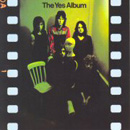 This is one of the Yes albums closest to my heart. Not because it was their best (most people would grant that distinction to Close To The Edge), but because these were the songs I heard, for the first time, live that day when Yes warmed up for Grand Funk Railroad. That show had such a profound impact on me that whenever I hear this album (especially the song "Yours Is No Disgrace," whose opening chords still run chills down my back), I'm transported back over 30 years to that auspicious day at the Yale Bowl. I can vividly hear the concert and can see the group onstage (especially Chris Squire's fur boots and Tony Kaye's penchant for playing Hammond organ with one hand thrust above his head). Personal revelations aside, it was with Yes's third album that it all came together for the group.
This is one of the Yes albums closest to my heart. Not because it was their best (most people would grant that distinction to Close To The Edge), but because these were the songs I heard, for the first time, live that day when Yes warmed up for Grand Funk Railroad. That show had such a profound impact on me that whenever I hear this album (especially the song "Yours Is No Disgrace," whose opening chords still run chills down my back), I'm transported back over 30 years to that auspicious day at the Yale Bowl. I can vividly hear the concert and can see the group onstage (especially Chris Squire's fur boots and Tony Kaye's penchant for playing Hammond organ with one hand thrust above his head). Personal revelations aside, it was with Yes's third album that it all came together for the group.
Although Yes's first two albums revealed moments of what would become the early Yes sound, the songs on The Yes Album were light years more advanced. Specifically, The Yes Album sounded as if it were recorded five years after Time And A Word, rather than only one. In a way, Yes was a different group; Peter Banks had left, to be replaced by Steve Howe. How much had Howe to do with the difference between the first two albums and this one? One can never know, but Howe's unique style and energetic playing were a perfect match for the burgeoning group.
Unlike Pink Floyd, Genesis, and King Crimson, whose music tended toward the dark side, Yes's sound on this album was as positive as the group's name, filled with joyous harmony, upbeat instrumentation, and positive lyrical messages. The new Yes burst from the speakers with a blissful energy that couldn't be ignored. Yes's music at this point was as complex as any prog at the time, but was still accessible thanks to its melodious nature. To help things along, the general public was warming up to progressive music in a big way. Even the mainstream press, despite the negative attitude they would adopt towards prog in the future, praised this "new" group from England.
As for the songs, "Yours Is No Disgrace" was a masterpiece of early prog, weaving together complex electric and acoustic sections with skill and style, while the acoustic-guitar solo number, "The Clap," was to become Steve Howe's trademark. Howe also dominates the otherworldly adventure, "Starship Trooper," which, like "Yours Is No Disgrace," demonstrated the group's skill at piecing together long arrangements with sections of differing meter and mood. "I've Seen All Good People" dominated FM airplay and is still among Yes's most familiar songs, along with "Roundabout." The amazing "Perpetual Change" featured a bold section in which the band played two completely different pieces one on top of the other, a feat that they also managed to pull off in a concert setting.
Says Rolling Stone in a four-star review of the remastered edition:
"It was the addition of Steve Howe's guitar pyrotechnics that finally allowed Yes to find their true identity.... Yes Album is a gigantic leap forward [over the first two albums], with extended workouts such as the ethereal "Starship Trooper" emphasizing the band members' individual virtues."
Fragile (1972)
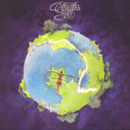 If Yes's sound finally came together on The Yes Album, with Fragile the group polished that sound into a gleaming, multi-faceted jewel. By combining their cheerful melodies and harmonies with increasingly complex arrangements, in Fragile, Yes turned out one of the greatest progressive-rock albums of all-time. In my mind, few other prog albums have come close to Fragile. (Should I name a few contenders? How about Yes's own Close To The Edge. Or maybe Genesis's Selling England By The Pound. Or King Crimson's Lark's Tongues In Aspic.) Part of Fragile's success was in no small measure due to the addition of keyboard virtuoso Rick Wakeman, who brought the landscape of Yes's music to heights that rock enthusiasts had heretofore only imagined.
If Yes's sound finally came together on The Yes Album, with Fragile the group polished that sound into a gleaming, multi-faceted jewel. By combining their cheerful melodies and harmonies with increasingly complex arrangements, in Fragile, Yes turned out one of the greatest progressive-rock albums of all-time. In my mind, few other prog albums have come close to Fragile. (Should I name a few contenders? How about Yes's own Close To The Edge. Or maybe Genesis's Selling England By The Pound. Or King Crimson's Lark's Tongues In Aspic.) Part of Fragile's success was in no small measure due to the addition of keyboard virtuoso Rick Wakeman, who brought the landscape of Yes's music to heights that rock enthusiasts had heretofore only imagined.
Yes's magnificent vision on this album would not only spawn another big hit in the addictive track "Roundabout," but would also cement their reputation as one of the premiere groups of the day, prog or otherwise. Part of the genius of Fragile lay in its careful balance between commercially viable music and complex art rock. Less adventurous listeners could delight to the pristine vocal harmonies and melodies, whereas bolder listeners could dig ever deeper into the twisted puzzle of Yes's sophisticated symphonic arrangements. In short, despite its virtuosity and intricacy, Fragile was an album just about anyone could love.
Still, the music here evidenced Yes's continued journey toward the type of elaborately woven musical tapestries that would, with the next album, leave the casual listener perplexed and alienated. Luckily, the audience for progressive rock was growing by leaps and bounds, and, even leaving the Top 40 crowd behind, Yes would soon have no trouble moving from small theaters to large arenas. (By the way, Fragile featured the first Yes cover painted by Roger Dean, an artist whose artwork would, over the following years, visually define prog-rock.)
Says Rolling Stone in a four-star review:
"Gorgeous melodies, intelligent, carefully crafted, constantly surprising arrangements, concise and energetic performances, cryptic but evocative lyrics...Yes is quite boggling and their potential seemingly unlimited....When it's all working, the music made by Yes is what the best music always is, a powerful and moving emotional experience."
Close To The Edge (1972)
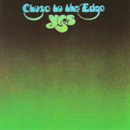 Many consider Close To The Edge to be Yes's crowning glory. One thing is for sure: Close To The Edge crossed the borders of commercialism and landed far into the land of pure prog. The title song was an unheard of 19 minutes and began with an intro that bordered on the avant garde, presaging an aggressive sound that would culminate a couple of years later with the album Relayer. Even in the song's more melodic sections, the melodies were more subtle -- and darker -- than what had come before. In any case, "Close To The Edge" featured a brilliant arrangement that would become the blueprint for true symphonic prog. (For the details, please see my article "The Prog Life: A Universe Of Bad Music," in which I discuss in great detail the song structure of "Close To The Edge").
Many consider Close To The Edge to be Yes's crowning glory. One thing is for sure: Close To The Edge crossed the borders of commercialism and landed far into the land of pure prog. The title song was an unheard of 19 minutes and began with an intro that bordered on the avant garde, presaging an aggressive sound that would culminate a couple of years later with the album Relayer. Even in the song's more melodic sections, the melodies were more subtle -- and darker -- than what had come before. In any case, "Close To The Edge" featured a brilliant arrangement that would become the blueprint for true symphonic prog. (For the details, please see my article "The Prog Life: A Universe Of Bad Music," in which I discuss in great detail the song structure of "Close To The Edge").
The remaining tracks on the album, "And You and I" and "Siberian Khatru" (a favorite concert opener), were more like what Yes fans of the day expected, the former boasting lighter and more uplifting melodies with regal interludes and the latter bringing forth Yes's considerable energy in the form of Steve Howe's torrid guitar work and Chris Squire's gargantuan bass lines. By this time, Squire's bass playing had conquered the globe and turned him into one of the most respected bassists in rock music, standing tall along the likes of The Who's John Entwistle.
All throughout the album, Rick Wakeman's keyboards proved that his contribution to Fragile's musical successes was no coincidence. His background washes soared, his solos ranged from delicate, staccato melodies to shrieking synth lines, and his rhythm work settled into just the right grooves. As for the rest of the band, Bruford's drumming sounded more Bruford-ish than ever. And, of course, as always there was those glorious vocal harmonies, pinned down by Jon Anderson's almost supernatural vocal style. (Is there a purer male voice in rock music?)
Says Rolling Stone in yet another four-star review:
"[Yes's] music ... shines with a freshness and crispness that doesn't seem likely to tarnish quickly ... The band firmly and beautifully manipulates the whole of its gargantuan sound, not only handling drastic dynamic contrasts with breath-taking ease, but also taking things from a taut, compressed, coiled-spring feel to spacious, expansive vistas."
Conclusion
With the release of Close To The Edge, Yes had, by most people's reckoning, reached the pinnacle of their career. Yes would continue to put out many great albums, but with the release of their next album, Tales From Topographic Oceans, the critics' love affair with the group came to an abrupt end. We'll pick up the discussion at this point in the next part of this omnibus series.
Links: Yes, Grand Funk Railroad, King Crimson, Pink Floyd, Genesis
Copyright © by ProgressiveWorld.net All Right Reserved.
Published on: 2003-08-24 (7877 reads)

